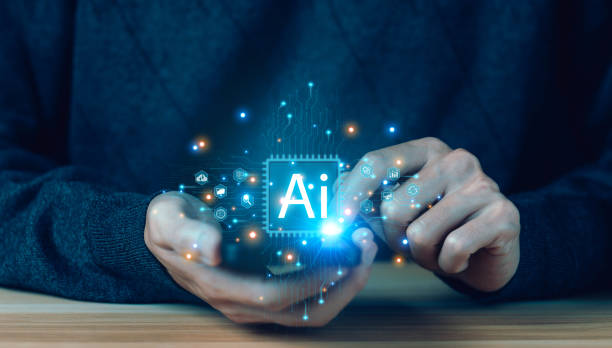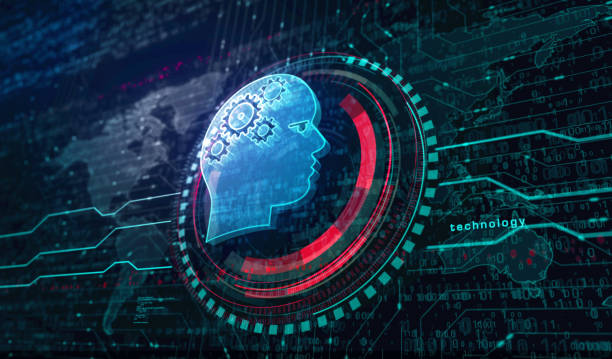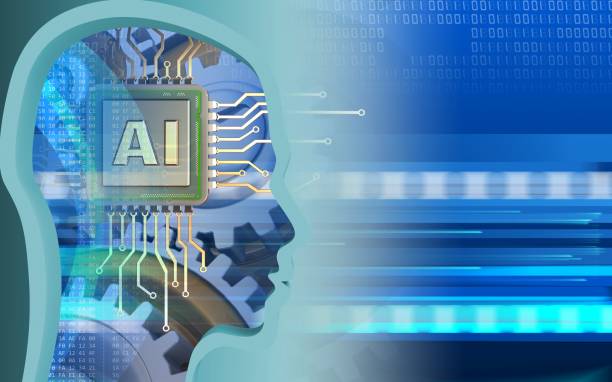What is Artificial Intelligence? Definitions and Basic Concepts

Artificial Intelligence or AI is a branch of computer science that deals with building machines capable of performing tasks that typically require human intelligence.
This definition includes abilities such as learning, reasoning, problem-solving, understanding natural language, and pattern recognition.
Artificial intelligence attempts to model human thought processes and implement them in computer systems.
#Machine_Learning is one of the main sub-branches of artificial intelligence, which allows machines to learn from data without being explicitly programmed.
In fact, machines identify patterns and relationships in data and use them for prediction or decision-making.
Deep Learning is another advanced branch of artificial intelligence that uses artificial neural networks with many layers to analyze complex data.
The ultimate goal of artificial intelligence is to create systems that can perform complex tasks independently and with high efficiency.
Artificial intelligence can be widely used in various industries, including medicine, finance, transportation, and manufacturing.
Is your online store ready to attract maximum customers and increase sales? Rasaweb transforms your online business with modern and efficient online store designs.
✅ Increased speed and improved SEO
✅ Excellent user experience on mobile and desktop⚡ Get a free consultation for online store design from Rasaweb!
History and Evolution of Artificial Intelligence

The history of Artificial Intelligence dates back to the 1950s, when scientists such as Alan Turing and John McCarthy began exploring the possibility of building intelligent machines.
In 1956, the Dartmouth Conference is recognized as a turning point in this field, where the term artificial intelligence was first used, and the initial goals and orientations of this field were defined.
In the early decades, progress was slow due to hardware and software limitations, but nevertheless, projects such as ELIZA and SHRDLU showed that machines could interact with humans using natural language.
In the 1980s and 1990s, with the emergence of expert systems, artificial intelligence entered a new phase.
Expert systems collected specialized knowledge in specific fields such as medicine or engineering and used it to solve complex problems.
However, these systems also had limitations, including difficulty in updating knowledge and inability to learn from new experiences.
Today, with recent advances in #Machine_Learning and deep learning, artificial intelligence is rapidly evolving and finding wider applications in various industries.
Advanced algorithms and access to big data have made it possible to build smarter and more efficient systems.
Types of Artificial Intelligence: Approaches and Classifications

Artificial intelligence can be divided into different categories based on their abilities and performance.
One of the most common classifications is based on capabilities, which includes Narrow AI, General AI, and Super AI.
Narrow AI, also known as weak AI, is designed to perform specific tasks and performs very well in that area.
Examples of narrow AI include facial recognition systems, voice assistants, and product recommendation systems.
General AI, also known as strong AI, has cognitive abilities similar to humans and can perform any task that a human can perform.
This type of artificial intelligence is still in the research stage and has not yet been fully realized.
Super AI, which is beyond human intelligence, can surpass humans in terms of intelligence and problem-solving abilities.
This type of artificial intelligence has been identified as a potential threat to humanity.
Another classification is based on approaches, which includes symbolic approach, connectionist approach, and evolutionary approach.
The symbolic approach focuses on using symbols and logical rules to represent knowledge and reasoning.
The connectionist approach uses artificial neural networks to learn and process information.
The evolutionary approach uses evolutionary algorithms to optimize artificial intelligence systems.
| Type of Artificial Intelligence | Description | Examples |
|---|---|---|
| Narrow AI | Focused on performing specific tasks | Facial recognition systems, voice assistants |
| General AI | Cognitive abilities similar to humans | (Under development) |
| Super AI | Beyond human intelligence | (Theoretical) |
Applications of Artificial Intelligence in Various Industries

The applications of artificial intelligence in various industries are very broad and diverse.
In the field of medicine, artificial intelligence can be used for disease diagnosis, drug design, and personalized healthcare.
Artificial intelligence systems can analyze medical images and diagnose disease patterns with high accuracy.
In the financial industry, artificial intelligence can be used for fraud detection, risk management, and personalized financial services.
Machine learning algorithms can identify suspicious patterns in financial transactions and prevent fraud.
In the field of transportation, artificial intelligence can be used to develop self-driving cars, manage traffic, and improve road safety.
Self-driving cars use #artificial_intelligence to understand their surroundings and make decisions about route and speed.
In the manufacturing industry, artificial intelligence can be used to optimize production processes, predict equipment failures, and improve product quality.
Artificial intelligence systems can analyze sensor data and identify failure patterns.
In the field of education, artificial intelligence can be used to provide personalized education, evaluate student performance, and develop smart educational tools.
Artificial intelligence systems can identify the learning needs of each student and provide appropriate educational content.
In the area of customer service, artificial intelligence can be used to answer customer questions, provide technical support, and solve their problems.
Artificial intelligence chatbots can answer customer questions 24/7.
Tired of your online store not generating as much revenue as it could? Rasaweb, a specialist in designing professional online stores, solves this problem once and for all!
✅ Increase sales rate and revenue
✅ High loading speed and unparalleled user experience
⚡ Get a free consultation on online store design
Pros and Cons of Artificial Intelligence: A Detailed Review

Artificial intelligence has numerous advantages and disadvantages that should be carefully considered.
The main advantages of artificial intelligence include increased productivity, reduced errors, improved decision-making, and better services.
Artificial intelligence systems can perform tasks faster and more accurately than humans, thereby increasing productivity.
Also, artificial intelligence can help humans in complex decision-making by providing accurate analyses and reliable predictions.
On the other hand, artificial intelligence also has disadvantages, including high cost, the need for expertise, ethical and social issues, and the risk of job loss.
The development and implementation of artificial intelligence systems require a lot of investment and require specific expertise.
Also, artificial intelligence can create new ethical and social issues, such as discrimination, privacy, and accountability.
In addition, artificial intelligence can lead to job losses in some industries, as machines can perform tasks that were previously performed by humans.
Therefore, it is essential that the advantages and disadvantages of artificial intelligence are carefully considered and that appropriate policies and regulations are developed to manage risks and capitalize on opportunities.
Challenges and Limitations of Artificial Intelligence

Artificial intelligence faces numerous challenges and limitations that prevent the full realization of its potential.
One of the main challenges is the lack of quality training data.
Machine learning algorithms need a lot of data to learn and improve their performance, but collecting and preparing this data can be time-consuming and costly.
Another challenge is the interpretability of artificial intelligence models.
Many deep learning models, such as neural networks, act as black boxes, meaning that it is difficult to understand how they make decisions.
This can reduce trust in these models and limit their use in some areas.
Ethical issues are also another important challenge of artificial intelligence.
Artificial intelligence algorithms can make decisions that have significant impacts on people’s lives, such as making decisions about hiring, granting loans, or determining punishments.
Therefore, it is essential that these algorithms are designed to operate fairly and impartially.
In addition, issues related to privacy and data security must also be carefully considered.
Artificial intelligence systems often have access to a lot of personal data, and this data must be securely protected.
Finally, hardware limitations can also hinder the advancement of artificial intelligence.
Training complex deep learning models requires a lot of processing power, and this can increase the cost of developing and implementing these models.
The Future of Artificial Intelligence: Visions and Possibilities

The future of artificial intelligence is filled with exciting visions and possibilities.
With continuous advances in #Machine_Learning, deep learning, and hardware, artificial intelligence is expected to play an increasingly important role in our lives in the coming years.
One of the key trends is the expansion of artificial intelligence applications in various industries.
Artificial intelligence will be increasingly used in areas such as medicine, finance, transportation, manufacturing, education, and customer service.
Artificial intelligence is expected to lead to increased productivity, reduced costs, improved quality of products and services, and the creation of new opportunities.
Another trend is the development of general artificial intelligence.
Although we are still far from fully realizing this goal, research in this area is progressing rapidly.
General artificial intelligence can have cognitive abilities similar to humans and perform any task that a human can perform.
This can lead to major transformations in society and the economy.
However, the development of general artificial intelligence also comes with many ethical and social challenges that must be carefully considered.
In addition, artificial intelligence is expected to be increasingly combined with other technologies, such as the Internet of Things, blockchain, and virtual reality.
This combination can lead to the creation of smarter and more efficient systems that are capable of solving complex problems.
| Application Area | Examples | Potential Impacts |
|---|---|---|
| Healthcare | Disease diagnosis, personalized treatment | Improved patient outcomes, reduced costs |
| Finance | Fraud detection, risk management | Increased security, reduced losses |
| Transportation | Self-driving cars, traffic management | Reduced accidents, improved efficiency |
| Manufacturing | Automation, quality control | Increased productivity, reduced costs |
Ethical and Social Considerations of Artificial Intelligence

The development and use of artificial intelligence brings important ethical and social considerations that must be carefully considered.
One of the main issues is discrimination.
Artificial intelligence algorithms can unintentionally discriminate if their training data is biased.
For example, if a facial recognition algorithm is trained using data that mostly includes images of white people, it may perform poorly in recognizing the faces of non-white people.
Therefore, it is essential that training data is carefully reviewed and that bias is prevented.
Another issue is privacy.
Artificial intelligence systems often have access to a lot of personal data, and this data must be securely protected.
Misuse of personal data can lead to privacy breaches and harm to individuals.
Therefore, it is essential that appropriate laws and regulations are developed to protect personal data.
In addition, the issue of accountability must also be considered.
If an artificial intelligence system makes a wrong decision that leads to harm to individuals, who will be responsible? This question does not yet have a clear answer and requires further discussion and investigation.
Finally, the issue of job loss must also be considered.
Artificial intelligence can lead to job losses in some industries, as machines can perform tasks that were previously performed by humans.
Therefore, it is essential that appropriate policies are developed to support people who lose their jobs.
Are you frustrated with losing customers because of the old look or slow speed of your online store? The expert Rasaweb team solves these problems by designing a professional online store!
✅ Increase customer trust and brand credibility
✅ Blazing speed and excellent user experience
Get a free consultation with Rasaweb right now ⚡
How to Learn Artificial Intelligence: Resources and Educational Paths

Learning artificial intelligence can be a challenging but very rewarding process.
Fortunately, there are numerous resources and educational paths to start and advance in this field.
One of the best ways to start is to take online courses.
Platforms such as Coursera, edX, and Udemy offer a variety of courses in the field of artificial intelligence, machine learning, and deep learning.
These courses usually include training videos, exercises, and projects and help you to understand the basic concepts well.
Also, studying books and scientific articles can also be very useful.
There are many books in the field of artificial intelligence that comprehensively explain basic and advanced concepts.
Scientific articles also help you to become familiar with the latest advances and research in this field.
In addition, participating in conferences and training workshops can also be a good opportunity to learn and network with other enthusiasts and experts.
Finally, doing practical projects is also very important.
Try to choose projects that are challenging and help you to put your skills into practice.
Practical projects help you to understand concepts better and gain practical experience.
The learning path should be tailored to your level of knowledge and interests.
If you are a beginner, it is better to start with the basic concepts and gradually move towards more advanced concepts.
Also, it is important to continue learning continuously and to be familiar with the latest advances in this field.
The Impact of Artificial Intelligence on the Future of Work

Artificial intelligence will have a profound impact on the future of work, both in terms of creating new opportunities and in terms of changing the nature of existing jobs.
On the one hand, artificial intelligence can lead to job losses in some industries, as machines can perform tasks that were previously performed by humans.
For example, the automation of production processes can lead to a reduction in the need for production line workers.
On the other hand, artificial intelligence can also create new job opportunities.
The development, implementation, and maintenance of artificial intelligence systems require skilled professionals in fields such as #Machine_Learning, data mining, and software engineering.
Also, artificial intelligence can lead to the creation of new jobs that do not currently exist.
For example, artificial intelligence ethics specialists, human-machine interaction designers, and artificial intelligence trainers are among the new jobs that may arise in the future.
In addition, artificial intelligence can also change the nature of existing jobs.
In many jobs, artificial intelligence can act as an auxiliary tool for humans and help them in performing their tasks.
For example, doctors can use artificial intelligence to diagnose diseases, lawyers can use artificial intelligence to search for legal documents, and teachers can use artificial intelligence to provide personalized education.
Therefore, it is essential that people keep their skills up-to-date and prepare for the jobs of the future.
Learning skills related to artificial intelligence, such as programming, data mining, and data analysis, can help people to succeed in the competitive job market of the future.
FAQ
| Question | Answer |
|---|---|
| What is the definition of Hoosh Masnooei (Artificial Intelligence)? | It is a field in computer science that aims to create intelligent machines that can think, learn, solve problems, and make decisions like humans. |
| Mention some common applications of Artificial Intelligence. | They include self-driving cars, voice assistants (such as Siri and Alexa), recommendation systems (such as Netflix and Amazon), facial recognition, and medical diagnostics. |
| What is the difference between Narrow Artificial Intelligence (ANI) and General Artificial Intelligence (AGI)? | Narrow Artificial Intelligence is specialized in a single and specific task, while General Artificial Intelligence possesses human intellectual ability to perform any cognitive task. |
| What is Machine Learning and how does it relate to Artificial Intelligence? | Machine Learning is a branch of Artificial Intelligence that focuses on developing algorithms that allow systems to learn from data without explicit programming. |
| What are Artificial Neural Networks? | They are computational models inspired by the structure and function of the human brain, and they are used in deep learning to process data and discover complex patterns. |
| Mention some ethical challenges related to Artificial Intelligence. | They include issues of privacy, bias in data and algorithms, job loss, and responsibility in the event of errors or unfair decisions. |
| What is Natural Language Processing (NLP)? | It is a branch of Artificial Intelligence that focuses on enabling computers to understand, interpret, and generate human language in a useful and interactive manner. |
| How can Artificial Intelligence affect the labor market? | It can lead to the automation of some routine tasks, requiring the retraining of workers and creating new jobs in the fields of design, development, and maintenance of Artificial Intelligence systems. |
| What is Computer Vision? | It is a field in Artificial Intelligence that enables computers to “see,” understand, and interpret images and videos in the same way that humans do, enabling them to recognize objects and faces. |
| What is the importance of data in the development of Artificial Intelligence systems? | Data is the fuel that feeds Artificial Intelligence systems, especially in machine learning. The quality and quantity of data greatly affect the accuracy and performance of models and their ability to learn and make correct decisions. |
And other advertising services of Rasa Web Advertising Agency
Smart Brand Identity: A fast and efficient solution to attract customers with a focus on custom programming.
Smart Advertising Campaign: Professional optimization for user engagement using precise audience targeting.
Smart Marketing Automation: A dedicated service for online growth based on custom programming.
Smart Advertising Campaign: A professional solution for digital branding with a focus on intelligent data analysis.
Smart Sales Automation: A fast and efficient solution for user engagement with a focus on attractive user interface design.
And more than hundreds of other services in the field of internet advertising, advertising consulting, and organizational solutions
Internet Advertising | Advertising Strategy | Advertorial Report
Resources
What is Artificial Intelligence and what are its applications?
,Artificial Intelligence Training – Beginner to Advanced
,Artificial Intelligence – Wikipedia
,What is Artificial Intelligence? Review of applications, advantages and disadvantages
? Rasaweb Afarin Digital Marketing Agency, specializing in providing innovative solutions including secure website design and SEO optimization for the sustainable growth of your business.
📍 Tehran, Mirdamad Street, next to Central Bank, Southern Kazerun Alley, Ramin Alley No. 6


